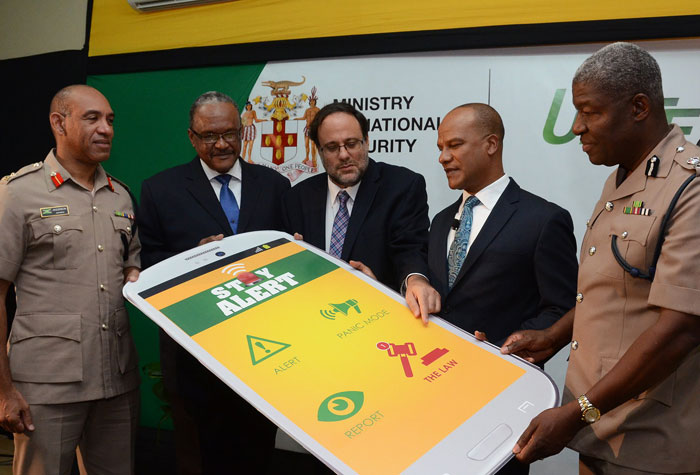Critical Crime Fighting Legislation Passed Last Year
By: , January 17, 2014The Key Point:
The Facts
- The enactment of the lotto scam legislation was accompanied by major thrust by the Government to educate Jamaicans about the devastating impact of the scam.
- The Ministry and the police remained steadfast in their efforts to cauterize crime, in December launching a three-pronged crime prevention strategy called: ‘United for Change’ in December.
The Full Story
During 2013, considerable focus was given to legislations that are critical in the fight against crime.
High on the agenda was the Law Reform (Fraudulent Transactions) (Special Provisions) Act, which aims to prosecute persons involved in the illegal lottery scam.
This law addresses, among other things: obtaining any property or inducing any person to confer any benefit on any person by false pretence; inviting or otherwise inducing a person to visit Jamaica for the purpose of committing an offence under the Act; and knowingly conducting a financial transaction with the proceeds of an offence.
It also makes provision for powers of search and seizure and restitution, and for guilty persons to be fined and sentenced to a term of imprisonment for up to 25 years.
The effectiveness of the law is already being seen as up to September 2013, approximately 50 persons were arrested and charged under the Act, commonly referred to at the ‘Lotto Bill’.
Parliament also amended the Proceeds of Crime Act (POCA) to strengthen the country’s anti-money laundering framework and help combat the financing of terrorism.
The changes, passed in October, places a $1 million limit on cash transactions with financial institution and facilitates the addition of an oversight regime for non-financial businesses and professions.
Anti-gang legislation was tabled in Parliament with the decision taken to allow a Joint Select Committee of Parliament to review the Bill.
Minister of National Security, Hon. Peter Bunting said this law, when enacted, will be important for the prosecution of gang members, who under the protection of their criminal brands have intimidated, terrorized and murdered hundreds of Jamaicans.
Other pieces of legislation under contemplation include the DNA Evidence Bill, which is in the final stages of review by various stakeholders. When passed into law it will allow the authorities to take DNA samples from persons arrested for specified offences.
The Trafficking in Persons (Prevention, Suppression and Punishment) (Amendment) Act was also passed to impose harsher penalties for the crime and to expand the list of offences under the law.
Under the amendments, convicted persons can be imprisoned for up to 20 years, with provision for the court to impose an additional 10 years if the offender commits any other offence while trafficking persons, such as debt bondage.
The legislation also increases from 10 to 20 years, the period of imprisonment for persons who knowingly receive financial or other benefits from trafficking in persons. There is also provision for a new offence of conspiracy, which is punishable by imprisonment of up to 20 years and/or fine.
The Organised Crime Investigative Division (OCID), reported that between January and September, 24 victims of human trafficking were rescued while 213 raids conducted.
Public Education
The enactment of the lotto scam legislation was accompanied by major thrust by the Government to educate Jamaicans about the devastating impact of the scam.
One of the segments of the programme is dubbed, ‘Silence Brings Violence’, which is being rolled out in schools islandwide.
During the latter part of the year, the Ministry also launched the ‘United for Change’ campaign, which features television, radio and print commercials, with messages encouraging ordinary Jamaicans, and interest groups, to join forces with the authorities to fight crime.
The initiative is founded on the strategies of interrupting crime, particularly gang activities; preventing the spread of these activities; and changing group behaviours.
United for Change
The Ministry and the police remained steadfast in their efforts to cauterize crime, in December launching a three-pronged crime prevention strategy called: ‘United for Change’ in December.
The initiative involves partnership with the experts in crime fighting and prevention, along with a host of other stakeholders, including members of the Diplomatic Corps. It seeks to rekindle hope in the society and mobilise law-abiding citizens, by working together in a united front against crime.
The initiative, Mr. Bunting said, is founded on the strategies of interrupting crime, particularly gang activities; preventing the spread of these activities; and changing group behaviours.
Among the innovations being developed to empower citizens in the fight against crime, is a mobile application, which will offer Jamaicans the opportunity to engage several modes of alerting the police, reporting crime, or to seek assistance.
Another key initiative emerging from this multi-sectoral approach to crime fighting, is the National Youth Violence Prevention Forum, is to be launched January.
Police Recruitment
Beefing up the numbers of crime fighters was also among the measures employed by the Government to improve national security. As part of the recruitment effort, more than 1,300 persons joined the Jamaica Constabulary Force (JCF) and the Island’s Special Constabulary Force in 2013.
A total of 187 policemen and women, inclusive of 44 Island Special Constabulary Force (ISCF) members graduated in September.
Correctional Services
Securing Jamaica also meant the proper rehabilitation for inmates through work of the Department of Correctional Services (DCS).
With Lieutenant Colonel Sean Prendergast demitting office as head of the DCS, former Deputy Commissioner of Police Jevene Bent took over as Commissioner of Corrections in June 2013.
The numbers of correctional officers were increased by an additional 195.
As part of correctional improvements the Government continued on its strategic path to protect and promote the rights and well-being of the nation’s children through the establishment of Boards of Visitors for facilities accommodating offenders who are juveniles.
The boards will give oversight to the operations of juvenile facilities, with the primary objective of ensuring that the best interests of the children in correctional and remand centres are protected.

